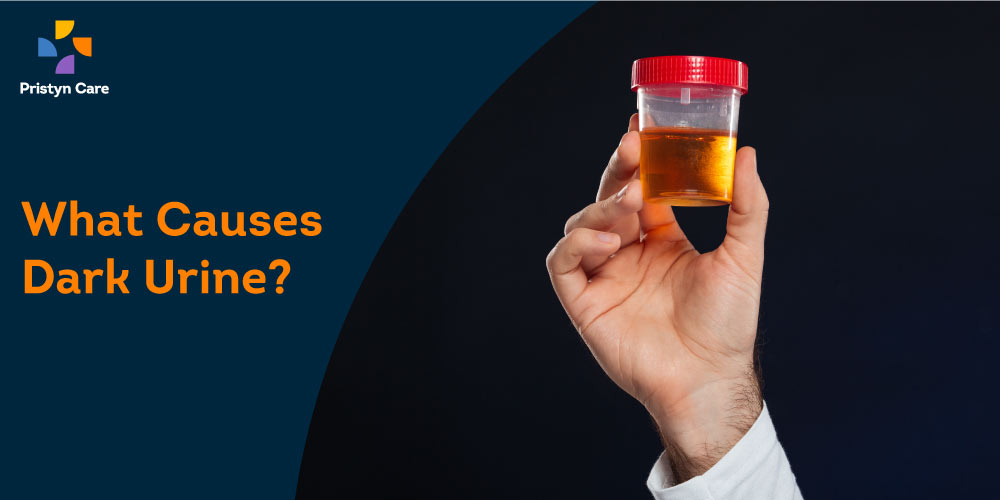
Table of Contents
Overview
Everyone has noticed changes in the colour and odour of their urine in their daily life.
Normal urine colour ranges from pale yellow to dark amber depending on the water to waste ratio. Darker urine can be of various colours but is usually brown, deep yellow, or maroon.
A dark yellow colour may indicate a need to increase your fluid intake. However, if the colour of your urine is still dark even after hydrating yourself with water, it is important to seek advice from your doctor.
What are the causes of dark urine?
The most common cause of dark urine is dehydration. However, there might be several other causes as well. Dark urine could indicate the presence of a potentially serious underlying condition. Some of the common causes are mentioned below:
- Hepatitis: Brown urine could be a cause of Hepatitis, which refers to the inflammation of your liver. Due to hepatitis, your liver isn’t able to clean your blood properly which leads to the increase of bilirubin in your blood and urine. This can turn your urine brown.
- Kidney disease: Some kidney diseases like post-streptococcal glomerulonephritis (PSGN) can turn your urine reddish-brown.
- Hematuria: Blood in the urine is medically termed Hematuria. This could be caused due to internal injury, kidney or bladder cancer/infections, viruses, kidney inflammation, etc.
- Anaemia: One particular form of anaemia, hemolytic anaemia, destroys all red blood cells and turns your urine brown. This can be transferred from your parents or can be developed after certain conditions like lupus, rheumatoid arthritis, etc.
- Medications: Certain medications like rifampin, phenazopyridine, etc. can turn your urine to the colour of reddish-orange.
- Intense exercise: Although rare, sometimes exercising intensely can cause your muscle cells to break making them leak. This condition is known as rhabdo and can cause your urine to turn brown. (Also read: Why urine color changes in pregnancy?)
- Hepatitis: Brown urine could be a cause of Hepatitis, which refers to the inflammation of your liver. Due to hepatitis, your liver isn’t able to clean your blood properly which leads to the increase of bilirubin in your blood and urine. This can turn your urine brown.
- Kidney disease: Some kidney diseases like post-streptococcal glomerulonephritis (PSGN) can turn your urine reddish-brown.
- Hematuria: Blood in the urine is medically termed Hematuria. This could be caused due to internal injury, kidney or bladder cancer/infections, viruses, kidney inflammation, etc.
- Anaemia: One particular form of anaemia, hemolytic anaemia, destroys all red blood cells and turns your urine brown. This can be transferred from your parents or can be developed after certain conditions like lupus, rheumatoid arthritis, etc.
- Medications: Certain medications like rifampin, phenazopyridine, etc. can turn your urine to the colour of reddish-orange.
- Intense exercise: Although rare, sometimes exercising intensely can cause your muscle cells to break making them leak. This condition is known as rhabdo and can cause your urine to turn brown. (Also read: Why urine color changes in pregnancy?)
When should you seek medical attention for dark urine?
You should seek medical attention if you see blood in your urine or experience dark urine that persists.
Additional signs and symptoms you should look out for are:
- Frequent urination
- Foul-smelling urine
- Pain or burning sensation while urinating
- Urgent need to urinate
- Foamy or cloudy urine
- Abdominal pain
- Pain during sexual intercourse
- Change in bowel movements
- Unexplained weight loss
- Nausea
- Yellowing of the skin and eyes
If you experience any of the above symptoms along with dark urine, contact your healthcare practitioner immediately.
How can diet influence the colour of your urine?
Before you get too worried about the change of colour of your urine, look back at what you ate.
Foods and beverages that are red, orange, or dark yellow can darken urine largely due to the beta-carotene they contain.
Beetroots, carrots, asparagus, fava beans, blackberries, rhubarb, etc. can change the colour of your urine.
Beeturia is the phenomenon of pink urine caused by beets. This occurs in only about 10% to 14% of the population. The chance of having beeturia increases dramatically if you have an iron deficiency.
Diagnosis of dark urine
Your doctor will always begin by taking a detailed medical history by asking several questions.
A physical examination will be conducted along with a urinalysis where you will provide a sample of your urine. If your urinalysis reveals unusual results, your doctor will conduct further tests.
Your doctor might also take a sample of your blood to check for elevated levels of liver enzymes, and other conditions such as diabetes.
Treatment of dark urine
People experiencing severe dehydration may need rehydration therapy. This process involves administering oral rehydration salts or fluids and electrolytes in the hospital.
Dark urine caused by food, medication or beverages are usually not a cause of concern and will return to its normal colour once the consumption stops.
In severe cases of hemolytic anaemia, blood transfusions, blood and bone marrow transplants, or surgery to remove the spleen may be necessary.
Antibiotics will be prescribed for Urinary Tract Infection. You will also be asked to drink a lot of cranberry juice.
For viral hepatitis, antiviral medications are the primary treatment.
Takeaway
Normally, dark urine is usually caused due to dehydration and can be changed to a pale yellow by drinking enough fluids. In some cases, however, it can be a sign of a more serious condition.
As a general rule of thumb, pale yellow urine means a healthy body.
If you notice that the discolouration of your urine lasts for more than a day or two, contact your healthcare practitioner to seek advice.















